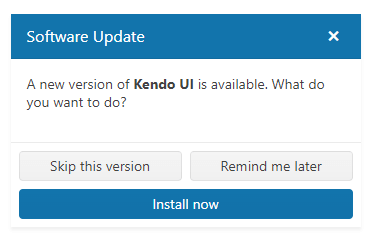Getting Started with the Dialog
This tutorial explains how to set up a basic Telerik UI for ASP.NET Core Dialog and highlights the key steps in the configuration of the component.
You will initialize a Dialog, add action buttons, and configure the handling of the Dialog's events. Finally, you can run the sample code in Telerik REPL and continue exploring the components.

Prerequisites
To successfully complete the tutorial, you need a project that is already configured to use the Telerik UI for ASP.NET Core components:
You can use the Telerik REPL playground and skip installing the components on your system and configuring a project.
-
You can prepare a Visual Studio project by following the following guide:
- Creating a new pre-configured project for the Telerik UI for ASP.NET Core components from a project template.
1. Prepare the CSHTML File
The first step is to add the required directives at the top of the .cshtml document:
-
To use the Telerik UI for ASP.NET Core HtmlHelpers:
@using Kendo.Mvc.UI -
To use the Telerik UI for ASP.NET Core TagHelpers:
@addTagHelper *, Kendo.Mvc
Optionally, you can structure the document by adding the desired HTML elements like headings, divs, paragraphs, and others.
2. Initialize the Dialog
Use the Dialog HtmlHelper or TagHelper to add the component to a page:
- The
Name()configuration method is mandatory as its value is used for theidand the name attributes of the Dialog element. - The
Title()configuration method sets a title that appears in the Dialog's header. - The
Content()configuration specifies the textual content that is rendered within the Dialog.
@using Kendo.Mvc.UI
@(Html.Kendo().Dialog()
.Name("dialog")
.Title("Software Update")
.Content("<p>A new version of <strong>Kendo UI</strong> is available. What do you want to do?<p>")
)
@addTagHelper *, Kendo.Mvc
<kendo-dialog name="dialog" title="Software Update">
<content><p>A new version of <strong>Kendo UI</strong> is available. What do you want to do?<p></content>
</kendo-dialog>
3. Configure the Dialog's Dimensions
The next step is to configure the width of the Dialog. Optionally, you can disable the modal overlay, which is enabled by default.
@using Kendo.Mvc.UI
@(Html.Kendo().Dialog()
.Name("dialog")
.Title("Software Update")
.Content("<p>A new version of <strong>Kendo UI</strong> is available. What do you want to do?<p>")
.Width(400)
.Modal(false)
)
@addTagHelper *, Kendo.Mvc
<kendo-dialog name="dialog"
title="Software Update"
width="400"
modal="false">
<content><p>A new version of <strong>Kendo UI</strong> is available. What do you want to do?<p></content>
</kendo-dialog>
4. Add Action Buttons
To make the component interactive, you can add action buttons by using the Actions() configuration method. To make one of the buttons stand out, set its Primary() property to true.
@using Kendo.Mvc.UI
@(Html.Kendo().Dialog()
.Name("dialog")
.Title("Software Update")
.Content("<p>A new version of <strong>Kendo UI</strong> is available. What do you want to do?<p>")
.Width(350)
.Modal(false)
.Actions(actions =>
{
actions.Add().Text("Skip this version");
actions.Add().Text("Remind me later");
actions.Add().Text("Install now").Primary(true);
})
)
@addTagHelper *, Kendo.Mvc
<kendo-dialog name="dialog"
title="Software Update"
width="350"
modal="false">
<actions>
<action text="Skip this version">
</action>
<action text="Remind me later">
</action>
<action text="Install now" primary="true">
</action>
</actions>
<content><p>A new version of <strong>Kendo UI</strong> is available. What do you want to do?<p></content>
</kendo-dialog>
5. Handle Dialog Events
The Dialog exposes several events that you can handle to customize the component's functions. In this tutorial, you will:
- Use the
Close()event to log a new entry in the browser's console whenever the Dialog closes. - Attach the
Action()event handler to the Install now button.
By default, the last action of each action button is to close the Dialog. As a result, selecting any of the Dialog's buttons will generate the Close() event and log an entry in the browser's console.
@using Kendo.Mvc.UI
@(Html.Kendo().Dialog()
.Name("dialog")
.Title("Software Update")
.Content("<p>A new version of <strong>Kendo UI</strong> is available. What do you want to do?<p>")
.Width(350)
.Modal(false)
.Actions(actions =>
{
actions.Add().Text("Skip this version");
actions.Add().Text("Remind me later");
actions.Add().Text("Install now").Primary(true).Action("onInstall");
})
.Events(ev => ev.Close("onClose"))
)
<script>
function onClose() {
console.log("Dialog closed");
}
function onInstall() {
console.log("Install now selected");
}
</script>
@addTagHelper *, Kendo.Mvc
<kendo-dialog name="dialog"
title="Software Update"
width="350"
modal="false"
on-close="onClose">
<actions>
<action text="Skip this version">
</action>
<action text="Remind me later">
</action>
<action text="Install now" primary="true" action="onInstall">
</action>
</actions>
<content><p>A new version of <strong>Kendo UI</strong> is available. What do you want to do?<p></content>
</kendo-dialog>
<script>
function onClose() {
console.log("Dialog closed");
}
function onInstall() {
console.log("Install now selected");
}
</script>
6. (Optional) Reference Existing Dialog Instances
You can reference the Dialog instances that you have created and build on top of their existing configuration:
-
Use the
idattribute of the component instance to establish a reference.<script> var dialogReference = $("#dialog").data("kendoDialog"); // dialogReference is a reference to the existing dialog instance of the helper. </script> -
Use the Dialog client-side API to control the behavior of the widget. In this example, you will use the
toFrontmethod to bring the Dialog instance on top of any other open Dialogs.<script> var dialogReference = $("#dialog").data("kendoDialog"); // dialogReference is a reference to the existing dialog instance of the helper. dialog.toFront(); // Bring the Dialog instance on top of any other open Dialogs. </script>
For more information on referencing specific helper instances, see the Methods and Events article.
Explore this Tutorial in REPL
You can continue experimenting with the code sample above by running it in the Telerik REPL server playground: